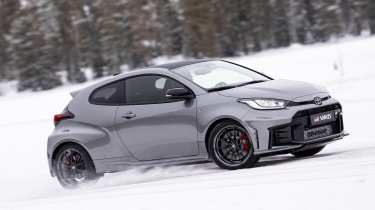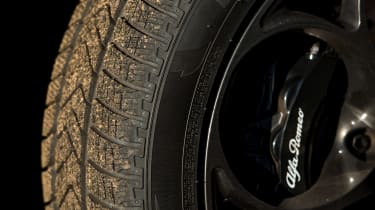Should you fit winter tyres to your car?
When temperatures drop and the weather takes a dive, fitting winter tyres can get you out of trouble – and potentially save you from a crash

Millions of road users across the northern hemisphere equip their cars with winter tyres when temperatures drop and driving conditions worsen. Certain countries enforce this by law, and in others, swapping summer rubber for winters is viewed as standard practice for staying safe on the road all year round. The UK, however, is a different story.
Less than five per cent of Brits fit winter tyres to their cars, with research showing that a large portion of UK motorists aren't aware of the advantages of seasonal rubber, and are unwilling to stump up the cash to swap. There appears to be a certain stubbornness around the subject, with a study by Michelin revealing that many British drivers view seasonal tyre changes as an inconvenience, even when presented with statistics proving their safety benefits.
On the face of it, this mindset is understandable given that the UK gets an average of two weeks of settled snowfall per year, and the fact many use all-season tyres designed to perform in a wide range of conditions. But there's no denying that winter rubber is the best solution for keeping you out of trouble when the weather takes a turn and grip is at a premium.
Some industry experts are baffled by the UK's general stance on the subject; ex-Formula 1 racer David Coulthard told evo he thinks winter tyres should be mandatory in the UK, especially in areas commonly affected by adverse weather ‘OK, certain cities can be exempt – you very rarely get snow in central London for example – but there should be some sort of blanket ruling like they have in Germany. It’s a night and day difference.’
Where does that difference come from? It’s all about the construction and design of the tyre, and its tread pattern. Compared to summer tyres, which generally use shallower tread to reduce flex, improve handling response and control temperature build up, the makeup of a winter tyre is almost the direct opposite. The tread tends to be deeper with more grooves to displace slush and snow and improve grip, with a softer rubber compound to keep the tyre supple and flexible in low temperatures. Summer tyres tend to give their best in conditions above 7 degrees, with winters designed to perform in temperatures below this. All-seasons are designed to offer a balance of the two characteristics, but naturally come with a compromise.
While in the UK you can legally drive on summer tyres or all-seasons in icy or even snowy conditions, you’d be much better off (and safer) on a set of winters. That goes for owners of four-wheel drive cars and SUVs, too – after all, the number of driven wheels doesn’t mean much when you’re trying to slow down on sheet ice.
Best winter tyres ranked
Last year, our sister site Auto Express conducted a comprehensive test to determine the best overall winter tyre, pitting products from Continental, Goodyear, Hankook, Pirelli, Vredestein, Falken and Goodride against one another at tyre testing facilities in Finland and Germany.
Each tyre was tested on snow, dry tarmac and wet tarmac to evaluate handling, traction, braking and stability across a range of conditions, as well as noise and fuel economy. Performance in each category was rated as a percentage, and for the overall score for each tyre, 50 per cent is allocated to wet performance, 20 per cent to snow and 20 per cent to dry, with the remaining 10 per cent shared between the other tests. The results were as follows:
| Position | Tyre | Score |
| 1st | Continental WinterContact TS 870 | 100 |
| 2nd | Goodyear UltraGrip Performance 3 | 99.6 |
| 3rd | Hankook i’cept RS3 | 99.2 |
| 4th | Pirelli Cinturato Winter 2 | 98.6 |
| 5th | Vredestein Wintrac | 97.8 |
| 6th | Falken Eurowinter HS02 | 97.5 |
| 7th | Goodride Snowmaster SW608 | 95 |
Winter v all-season v summer tyres
To illustrate the differences between the three main types of tyre across a variety of conditions, we included an all-season tyre (Goodyear Vector 4Seasons Gen-3) and a summer option (Continental PremiumContact 7) in the test above.
The all-season proved to be a competent all-rounder, beating the winter tyres in wet handling and braking tests – in the latter it stopped 1.5 metres earlier than the best winter. And at around 7 degrees (the crossover point between summer and winter rubber), it also came out on top in dry conditions. Snow was, of course, a different matter, with the all-season placing fifth overall.
Predictably, the summer tyre excelled in dry conditions – in braking it stopped 7.2 metres earlier than the best winter. Wet braking was also strong, and though the gap closed, the best winter needed an extra 5.5 metres to stop. The summer was, however, pretty much useless on snow, struggling badly for traction when settling off and failing to turn or stop with any level of confidence. Even though snow isn't a common occurrence in the UK, trying to drive on summer tyres not only means you could easily get stuck, it also substantially increases your chances of a crash.





